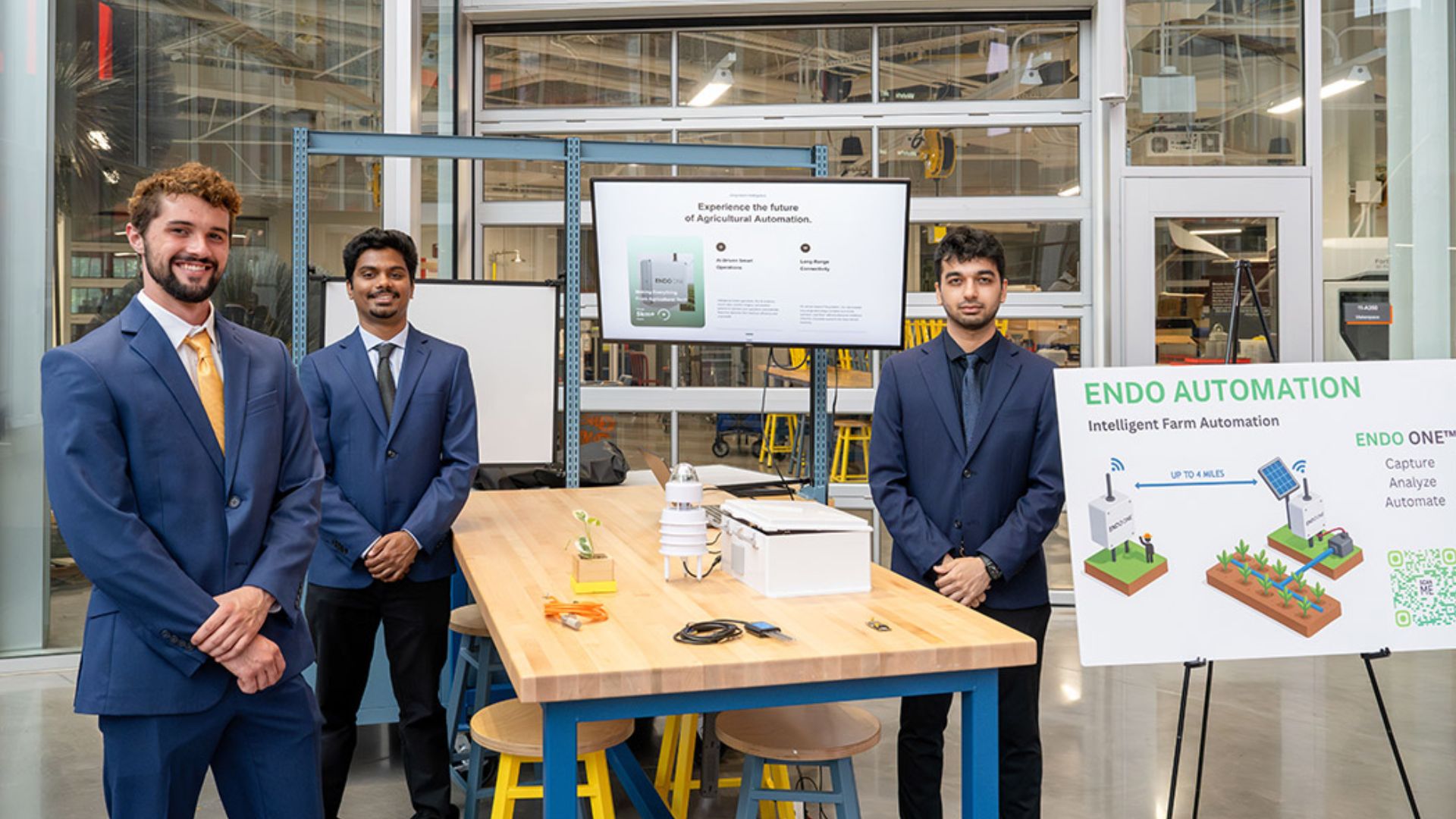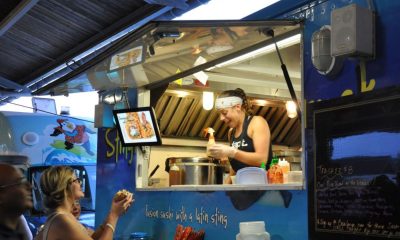Local News
Student business incubator offers dedicated space and resources to help aspiring entrepreneurs develop their ideas

Rochester, New York – Inside a small but buzzing space at the Saunders College of Business, a new wave of student innovators is shaping ideas that could soon grow into real businesses. It’s the first official cohort of the Bernard Kozel StartUP Program @ Saunders, and for the students taking part, it’s more than just a summer project—it’s a full immersion into the challenges and excitement of entrepreneurship.
One of those students is Zevez Zalay, a third-year finance and marketing major who has always been drawn to the idea of building communities. The inspiration struck after spending an entire day searching for a local spoken-word poetry group in Rochester and realizing how hard it was to find something that should have been simple. With that frustration came an idea. Together with business partner Nathan Jackson, a third-year software engineering student, Zalay co-founded GroupSoup—a social engagement platform that organizes recurring meetups in local businesses. The vision is to help people connect in authentic ways while giving small businesses a steady stream of new visitors and valuable customer feedback.
“There’s no convenient catalog for people looking to organize meetups unless you’re willing to cold message businesses on Facebook or send out emails, which is a tedious process,” Zalay explained. “We want to connect people who want to build community with businesses that want to bring people through the door.”
The Kozel StartUP Program, named after businessman and investor Bernard Kozel, is designed to help teams like GroupSoup take those early sparks of inspiration and turn them into viable ventures. It’s a 12-week summer experience that provides hands-on learning, mentorship from seasoned professionals, and the kind of peer-to-peer support that can make the difference between an idea that fades away and one that takes off.
Although the program’s name is new, its roots run deep. It began back in 2011 under a different identity—the RIT Student Accelerator—founded by professor Richard DeMartino and the late Rich Notargiacomo, who once led RIT’s Venture Creations business incubator. Since then, it has guided 167 student teams and nearly 500 students through 23 cohorts. This year’s rebranding marks a fresh chapter, backed by the Bernard Kozel Endowed Fund for Innovation and Entrepreneurship.
The format is intense but rewarding. Student teams work on their ideas full-time for the entire summer, meeting as a group at least twice a week. Between group sessions, they attend workshops, coaching meetings, and talks from guest speakers with real-world business experience. Each team receives an honorarium to help them focus on their project without financial strain. And at the end comes Demo Night—a high-energy showcase where teams present their ideas to an audience of friends, family, and potential investors.
For the founders of Endo Automation, the summer has been a chance to refine a solution to a very real problem: how to make irrigation affordable and efficient for farmers facing water shortages. Graduate software engineering students Devaj Mody and Shridhar Vilas Shinde, along with computer science major Lex Baker, developed an AI-enabled drip irrigation system that uses soil moisture and rainfall sensors to determine exactly when and how much water crops need.
“We noticed the issues with farmers across the board, especially those in more arid regions in India and the United States,” Mody said. “Water shortages, loss of crops, and the expense to run a farm are all barriers for them. We basically decided to design a system that’s able to carry out irrigation at a fraction of the cost, with all the benefits that the farmer would have.”
Their work in Rochester this summer has already paid off. Four farms in India, including a vineyard, will soon deploy their system, and the team is exploring World Bank programs for agricultural innovation.
The 2025 cohort was made up of eight diverse ventures. Alongside GroupSoup and Endo Automation were:
• CYPER, a cybersecurity assessment platform for small and medium-sized businesses.
• ModuCore, which produces personalized organizers for lifestyle artisans.
• Bone Bros, a semi-custom shoe brand focused on foot health.
• CollegeGO, a one-stop, budget-friendly resource for navigating the college application process.
• OpenSeek, an educational and job platform for early career UX designers.
• Obscura, a technology aimed at stopping AI theft of digital artwork.
A new element in this year’s program was the addition of co-op students, funded by Saunders College, who joined the startup teams as extra support. For some founders, it was the first time managing people who weren’t partners or stakeholders. “That was a great experience,” said Baker. “It was a different look into managing others who may not have a stake or equity in the company like the three of us. We had to learn how to manage those different expectations, which was great to learn.”
Anthony Testa, who helps direct the program, saw it as an important learning opportunity. “The co-ops added a new dynamic,” he said. “Integrating any group of people into a process is not without hard work. The Kozel teams are learning entrepreneurship, but they’re also learning how to be leaders and managers on the fly, which is really cool in this safe space.”
Beyond the official coaching and structured workshops, something else happened over the summer—teams became a community themselves. They traded design advice, helped troubleshoot customer research challenges, and even jumped in to assist with user experience issues. OpenSeek, for instance, lent UI/UX expertise to Endo Automation. A shared Discord channel kept everyone in touch, allowing quick feedback and resource sharing.
“This was definitely one of the more connected groups we have had,” said program manager Evan Vershay. “It’s always encouraged by Anthony and me, but at the end of the day it’s on them to really make it happen and connect with each other. They were great about that this year.”
The program’s future looks promising. This summer brought in 24 applications, the most ever, which allowed staff to select only the most driven and promising teams. “We had alumni and long-time supporters telling us this was the strongest cohort they’d ever seen,” Testa said. “These students came ready.”
With the momentum of this year’s success, applications for the next cohort—the program’s 24th—are already open. Prospective student entrepreneurs are encouraged to apply early, meet with program staff, and refine their concepts before the summer begins. For those accepted, the journey promises not only business knowledge but also lessons in leadership, resilience, and the art of collaboration.
In a setting that blends hard work with the thrill of creation, the Bernard Kozel StartUP Program has become more than an incubator. For students like Zalay and Mody, it’s a launchpad—not just for their businesses, but for the networks and skills that will follow them long after graduation. As they wrap up their summer with Demo Night, the hallmarks of their experience—shared problem-solving, long hours, and moments of breakthrough—will serve as a foundation for whatever comes next.
Because in the end, the program isn’t just about launching companies. It’s about launching people—people who have learned how to take an idea, shape it, test it, and share it with the world. And in that process, they’ve also learned something that’s harder to teach: that innovation works best when it’s built together.

-

 Local News12 months ago
Local News12 months agoNew ALDI store close to Rochester to begin construction in late 2025 or early 2026
-

 Local News12 months ago
Local News12 months agoRochester Lilac Festival announces exciting 127th edition headliners
-

 Local News10 months ago
Local News10 months agoCounty Executive Adam Bello and members of the county legislature celebrate exceptional young leaders and advocates at the 2025 Monroe County Youth Awards
-

 Local News10 months ago
Local News10 months agoThe 2025 Public Market Food Truck Rodeo series will begin this Wednesday with live music by the Royal Bromleys